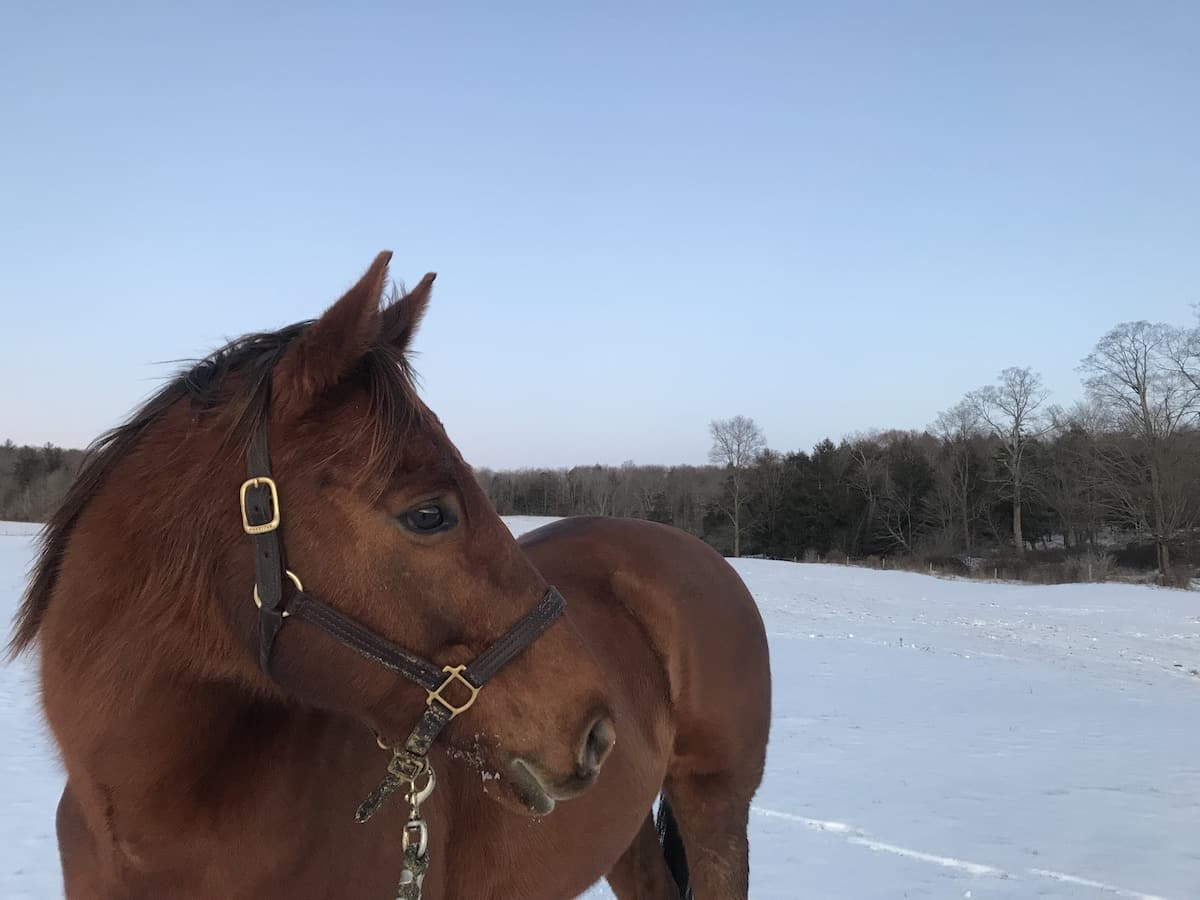Managing horses in cold weather is not difficult but there are some special concerns that need to be addressed in order to keep your horse safe, comfortable and healthy.

Kristen Kovatch Bentley
How cold is cold?
It depends! There is an old saying that is relevant here: “a horse can tolerate cold temperatures and a horse can tolerate wet conditions, but a horse has a difficult time dealing with weather conditions that are both cold and wet.” The toughest condition for a horse to deal with is a temperature at or near freezing combined with rain. 15°F (-9°C) and snow is less stressful to a horse than 34°F (1°C) and cold rain.
What determines the ability of an individual horse to tolerate inclement weather? The health status, age, body condition score, hair coat condition, metabolic status and nutritional status individually or collectively will determine how well an individual horse is able to tolerate inclement weather. A mature, but not aged horse that is healthy, in good condition with a normal winter hair coat receiving an adequate diet can tolerate sub-freezing temperatures and snow very easily. Remove one or more of these parameters (show ready hair coat in place of a winter coat for example), and the horse’s ability to tolerate colder temperatures decreases. Therefore, if you blanket your horse, keep your horse under lights to control hair growth and/or body clip your horse you need to take extra care that your horse is able to tolerate colder temperatures and inclement weather in the winter.
The temperature at which a horse must use a greater percentage of his/her caloric intake just to maintain a normal body temperature is referred to as the lower critical temperature (LCT) which is affected by age and nutrition as follows: (Cymbaluk, University of Saskatchewan, Saskatoon, Sask., Canada)
- Foal LCT = 20°C (68°F)
- Young horses LCT = -11°C (12°F) if fed ad lib
- Young horses LCT = 0°C (32°F) if limit fed
- Adult horses LCT = -15°C (5°F)
These temperatures should be used as guidelines only. The LCT for an individual horse can vary in a similar fashion to people that are “hot blooded” versus “cold blooded.” The major point being made here is that young or aged horses (even though not listed in the above list) will require more energy just to maintain their normal body temperature at a higher ambient temperature compared to mature horses in good condition who are able to tolerate much colder temperatures without difficulty. Therefore, young or aged horses in less than desirable condition should receive special care in regard to shelter and/or blankets compared to mature, healthy horses in good condition.
My horse shivers – does that mean he/she is cold stressed?
The answer is maybe. Shivering in horses is not identical to shivering in people. Shivering can be indicative of a normal method horses use to generate additional body heat in order to maintain normal body temperature. Therefore, do not become overly concerned because you notice shivering in your horse. Shivering does indicate that your horse is utilizing extra calories to maintain body temperature, however. If shivering persists for more than 4 – 6 hours it is an indication that your horse is presenting with cold stress and you should take steps to alleviate it. Blankets, housing in a stall, offering warm water, and/or feeding additional hay are all methods that will reduce cold stress in an individual horse.
Don’t Forget the Water!
A common and debilitating effect of cold stress is a reduction in water intake which in turn leads to a reduction in performance and may predispose to gastrointestinal disorders which in turn can lead to colic. Therefore, our objective in cold weather should be to maintain and hopefully enhance water intake. Research has demonstrated that horses offered cold and warm water simultaneously will actually prefer cold water. However, and here is a very important point, when offered cold water or warm water separately horses will consume a greater volume of warm water. Therefore, an effort should be made to offer horses tepid water during cold weather in an effort to increase their water intake. Does this take extra work and effort on your part? Yes. Yes it does. But the extra effort will be well worth it in regard to your horse’s health and performance.
Forage is Key
Providing forage on an ad lib basis is very beneficial to horses during cold weather. Forage is fermented in the horse’s large intestine; the process of fermentation generates substantial amounts of heat which is used to support body heat maintenance and reduces the level of cold stress an individual horse might experience during inclement weather. Keeping forage products in front of horses 24 hours a day is an excellent management tool during cold weather for this reason. Incorporating beet pulp based feeds such as Triple Crown Senior or Triple Crown Complete also enhances your horse’s ability to fend off cold stress. Providing additional calories during cold weather is a basic objective, keep in mind that providing those extra calories from forage and alternative fiber sources instead of grain sources will make your life much easier in the long run due to the additional benefit of fermentative heat.
Take Home Message:
The effective lower critical temperature of an individual horse is dependent upon the horse’s age, body condition, health, nutritional status and hair coat status. While mature and healthy horses with a normal winter coat are very capable of tolerating very cold temperatures and inclement weather with normal feeding and management practices, horses innately susceptible to cold stress due to age, hair coat status or nutritional status should be managed in a manner that takes into account their need for additional protection from the elements and insulation in the form of blankets and housing. Enhance water and forage intake in inclement weather to make your life and your horse’s life more manageable.

